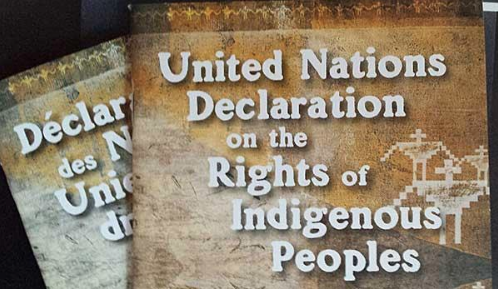This article was originally published by First Nations Drum
By Grand Chief Dr. Abel Bosum and Alex Neve
In 2010, former prime minister Stephen Harper publicly reversed his government’s opposition to the UN Declaration on the Rights of Indigenous Peoples. In a formal “statement of support,” the Harper government said that it had listened to Indigenous leaders in Canada and “learned from the experience of other countries” and was now “confident” that Canada could move ahead with implementation of the Declaration “in a manner that is consistent with our Constitution and legal framework.”
So why wouldn’t Conservative Members of Parliament and Senators support legislation intended to finally move ahead with the work of implementing the Declaration in Canada?
Bill C-262 is the private member’s bill introduced by NDP MP Romeo Saganash. Passage of C-262 would create a legal framework requiring the federal government to work collaboratively with Indigenous peoples on the measures needed to bring Canadian law and policy into line with the minimum global standards set out in the Declaration.
Critically, passage of the Bill C-262 would not suddenly change the legal status of the Declaration in Canada. Courts would continue to use the Declaration in the interpretation of Canada, just as they are already doing. However, passage of C-262 would establish an ongoing process of federal implementation that could not be easily abandoned by future governments.
The Bill enjoys widespread support. Out of 71 witnesses who appeared before a Parliamentary Committee examining the Bill last year, only one opposed adoption of C-262.
Yet, when it came to a vote in the House of Commons, Conservative MPs refused to join the other parties in supporting the Bill. Video widely circulated online even showed Conservative MPs giving each other a high five after they voted against the Bill.
Now the Bill is before the Senate where its fate will be decided. The Bill is being sponsored in the Senate by independent Senator Murray Sinclair. The support of the former Chief Commissioner of the Truth and Reconciliation Commission is a powerful symbol that the Bill is an opportunity to advance reconciliation in Canada. Unfortunately, however, the limited time remaining to adopt C-262 before the current session ends means that even a small minority opposing the Bill could threaten its passage into law.
A number of Conservative Senators have already gone on the record opposing the Bill. Their main concern seems to be that the UN Declaration could have far-reaching and unpredictable impacts in Canada. Some have already used procedural tactics to attempt to stall debate over the Bill.
These Senators seem to forget that the Declaration is not new – that it was developed over a period of more than twenty years and adopted by the United Nations more than a decade ago. They also seem to forget that a Conservative government studied the Declaration and came to the conclusion that it could and should support its implementation. And they are clearly ignoring the fact that the very purpose of the Bill is to ensure ongoing dialogue between government and Indigenous peoples over how the Declaration will be interpreted and applied in the future.
With an election looming, we are at a point where every issue on Parliament is seen as an opportunity to score points over political opponents. The cause of reconciliation, however, must not be dragged down by partisan politics.
Bill C-262 is something that every federal party could and should support. In doing so, they have an opportunity to send a clear message to the public about the importance they place on reconciliation.
Dr. Abel Bosum is Grand Chief of the Grand Council of the Crees (Eeyou Istchee) and Alex Neve is Secretary General of Amnesty International Canada.













